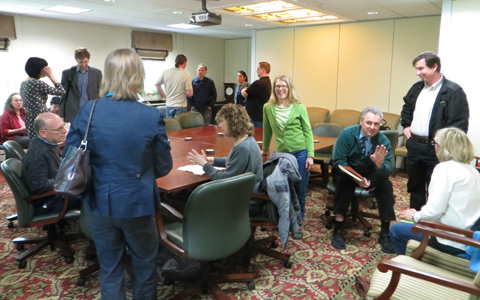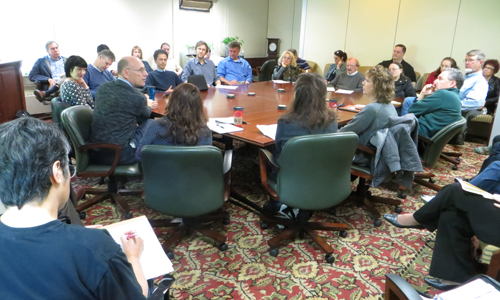College of Arts & Sciences faculty are tackling the challenges of the 21st century by building interdisciplinary and team-taught courses around a new set of curricular themes. This initiative seeks to provide students with a broad but integrated range of opportunities for building the critical skills and knowledge they need for successful careers, engaged citizenship and fulfilling lives.
“By combining the perspectives of the social sciences, natural sciences, and the humanities, students will gain a broad but integrated intellectual experience that gives meaning to the idea of the liberal arts,” says Dr. Robert Frank, Dean of the College of Arts & Sciences at Ohio University.
“For our faculty, themes provide opportunities for multi-disciplinary teaching and curricula and greater collaboration across departmental and disciplinary boundaries. The faculty who began working last spring to bring the idea of themes to life are relishing the opportunity to discover natural synergies with colleagues from other departments,” Frank said.
“For our students, themes will help revitalize student understanding and enthusiasm for our distribution requirements while improving the coherence of the curriculum.” With respect to knowledge, students are expected to develop depth of knowledge—through concentrated study in the major—as well as breadth of knowledge—delivered through the general education requirements at the university level and/or distribution requirements within the College of Arts & Sciences.
“Curricular themes represent a strategy that can be used by students to rationalize completion of the breadth of knowledge requirements. This is achieved through a set of multi-disciplinary courses and extracurricular activities organized around a topic of importance for the 21st century,” Frank says. “Ideally, a theme includes content from the humanities, natural sciences, and social sciences. However, it is not essential to have content from all these domains to have a viable theme. In its simplest conception, a theme is simply a set of related courses and experiences that provide a guide to fulfilling a substantial portion of the breadth of knowledge requirement.”
A Q&A with Dean Frank follows.
What are a few examples of curricular themes?
The following are currently under development and the contacts:
- Conflict and Cooperation—David Curp, History
- Making and Breaking the Law—Haley Duschinski, Anthropology
- Sustainability—Nancy Manring, Political Science
- Food Studies—Theresa Moran, English
- Wealth and Poverty—Yeong Kim & Edna Wangui, Geography
- Love and Hate (formerly Race and Gender)—Dr. Vincent Jungkunz, Political Science, and Dr. Ayesha Hardison, English
- Knowing the Future (formerly Future Studies) (Knowledge, Uncertainty & Prediction)—Daniel Phillips, Physics
- So, You Want to Change the World: Promise and Peril—Elizabeth Collins & Bill Owens, Classics & World Religions
- Becoming Human—Cory Crawford & Brian Collins, Classics & World Religions
Other possibilities under discussion include:
- Human impacts of technology
- Future studies
- Water and energy
- And the door remains wide open to new ideas and proposals.
What Problems Are Themes Designed to Solve?
Themes provide a vehicle for revitalizing student understanding and enthusiasm for our breadth of knowledge requirements while improving the coherence of the curriculum. Students will be better able to appreciate the value of the breadth requirement because they will be building a more sophisticated understanding of the issues and challenges addressed by the theme. They will be better able to articulate how the breadth requirement contributed to their Ohio University experience in concrete terms. The course offerings associated with a theme can be used by a student as a registration guide, which should yield a superior approach to selecting courses that fulfill existing breadth of knowledge requirements.
How Does a Theme Differ from a Major?
A major is designed to provide deep knowledge of a particular subject or discipline, while themes are problem-oriented and multi-disciplinary in nature. A theme introduces a student to the complexity of a significant global challenge or issue using a variety of perspectives. While a major has a proscriptive set of requirements, a theme has no requirements per se. Students will vary in the number and variety of theme-related courses and activities they complete.
How Does a Theme Differ from a Certificate?
A certificate is composed of a set of courses and experiences related to a specific topic. As with a major, a set of requirements is associated with completion of a certificate in order to provide specialized knowledge that may result in a credential or training. Both a certificate and a theme are interdisciplinary, but a theme has no requirements. It is simply a set of interrelated courses and extracurricular experiences. Rather than receive training, a student traces a common theme in multiple disciplines while meeting the College of Arts & Sciences distribution requirements. A set of courses and/or experiences drawn from a theme can be the basis of a certificate, but not all students following a theme will complete courses necessary for the certificate.
How Do Themes Support Curricular Innovation?
As faculty from different departments and colleges come together to develop a theme, they share ideas for multi-disciplinary approaches to course content, collaboration, team teaching and the integration of extracurricular activities into a coherent educational experience. Moreover, they also have the opportunity to think about how the existing courses that will continue to fulfill the majority of a student’s distribution requirements may relate in meaningful ways.
How might a fully elaborated curricular theme be organized?
There is no “one size fits all” model for the themes. Each will have its own structure and organization. That said, the following template has several attractive features.
Students could start with a freshman/sophomore level course designed to introduce a theme and its complexity. This course would be designed and taught by a team of faculty who provide multi-disciplinary perspectives. Students would be given opportunities to develop fundamental academic skills such as critical thinking, writing, oral communication, quantitative literacy and information literacy within the context of the theme. Mastery of content knowledge or a particular skill would not be the goal of the course, but rather, consciousness-raising about the complexity of the theme, promoting intellectual curiosity about the course content, setting standards for intellectual engagement and preparing students for theme-related courses embedded within departmental curricula.
Following the completion of the introductory theme course, students would enroll in disciplinary courses related to the theme. These courses would elaborate on theme-relevant content knowledge and skills. Ideally, these theme-relevant courses would be spread across the natural sciences, social sciences, the arts and humanities.
A culminating experience could be provided by a junior/senior level multi-disciplinary course, where students further elaborate their theme-related content knowledge and skills. This course could be designed as a seminar, or team-oriented project course, or theme-related capstone. The goal of the course would be moving students past an appreciation of the problems related to the theme to critical analysis and problem solutions. Course activities would support these goals. Additional opportunities to develop core skills (team-building, critical thinking, writing, oral communication, quantitative literacy and information literacy) would be part of the course.
Extracurricular experiences such as study abroad, undergraduate research, service learning and internship opportunities related to the themes could be integrated into the learning experience.
Who is welcome to participate in a curricular theme?
Any member of the university community, irrespective of college, is encouraged to participate in the development of the themes. We want to take advantage of all our university’s resources to create the best educational experience possible.
How do I get more information about the themes and their development?
Visit the Forum for status reports about the current themes, updates concerning the emergence of additional themes and information about how to get involved.




















3 Comments